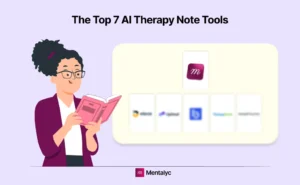Mental health professionals have many standards they have to follow when completing documentation. Quality documentation benefits clinicians as it helps protect them in cases of insurance audits and demonstrates medical necessity, and helps ensure you’re meeting the standards required by insurance companies.
Consistently writing quality progress notes and treatment plans is an essential tenet of any psychotherapist’s duties; however, this can cause anxiety and overwhelm for many mental health professionals. You may feel lost remembering what goes into a progress note or how you document an intake session.
With loads of information being presented in each psychotherapy session, it’s no wonder clinicians feel overwhelmed. Third-party payors then add additional standards that must be met, and you may feel like you’re drowning. It becomes even more of a task if you get behind and constantly play catch-up with notes.
If this sounds like you, constantly spiraling about being behind and overwhelmed, there are some ways you can become more effective at mental health documentation. Using the appropriate strategies and tools can help you get caught up and relieve the weight of the stress that documentation can cause.

New! Transfer your notes to EHR with a single click. No more copy-pasting.
Why does mental health documentation cause anxiety?
Taking notes and documenting client progress can cause anxiety for many mental health clinicians. Anxiety about documentation can happen for various reasons.
Some potential anxiety triggers for Mental Health Professionals, and documentation include:
- Falling behind on documenting progress notes
- Being audited by an insurance company and demonstrating medical necessity
- Trouble recalling your session with your clients
Many people don’t know that there are tools and strategies they can use to help reduce anxiety surrounding note-taking.
Falling behind on documentation
You’re not alone if you’ve fallen behind in writing your progress notes. We’ve all been there at one point or another. Falling behind on progress notes can feel overwhelming, and knowing how to get back ahead may be tricky.
If this sounds like you, here are some strategies you can use to get caught back up:
Setting timers: If you can find a timer system that works for you, use it! You block off periods of time and set timers to focus on notes and getting caught back up specifically. Some find it helpful to use the POMODORO technique, where you set a timer for 25 minutes, concentrate on a task, and then set a timer for a 5-minute break. Other people may benefit from setting timers for different intervals of focus and break periods.
Prioritizing documentation: When you’re trying to get caught up, focusing on what you can get done and blocking time to concentrate on notes can help. You don’t want to be behind forever, so maybe you schedule 30-minute to 1-hour blocks of time in your schedule where you specifically focus notes. Do this a few times a week, and you make significant progress depending on how behind you are.
Body doubling: If you’re having difficulty catching up on your notes, you may consider body doubling. Body doubling is the mere act of having someone there while working on a task. You still want to ensure some privacy for progress notes, as your notes must be protected for confidentiality reasons. You can try virtual body doubling at websites such as Focusmate, free to use up to three times per week.
Insurance company audits
Another reason that many Mental Health Professionals might experience anxiety is that if they accept insurance for payment, they may be subject to audits of their work. Insurance companies often request progress notes and intake evaluations from client charts. Insurance companies want to ensure that there is a medically necessary reason that clients are in therapy. If you want to feel less stressed when facing an insurance audit, there are some ways to protect yourself.
Understand documentation requirements: Many insurance companies want you to demonstrate medical necessity; you can do this by ensuring your notes have the required information.
Insurance companies often require the following components in your notes:
- Patient’s name and date of birth
- Date and time of session
- Diagnosis
- Treatment plan
- Goals and responses to therapy
You want to ensure you have clear and concise goals for treatment plans. One method to do this is by setting SMART goals.
SMART goals are specific, measurable, attainable, realistic, and time-sensitive. Insurance companies want to see that you have outlined a treatment plan for your client and how your client is or isn’t making progress. When you use SMART goals, your goals are clearly defined within a time-period and it helps you and you’re client measure progress.
Understand common mistakes that individuals make in documentation: Some insurance companies can make you pay back money if you don’t pass an audit. Understanding common mistakes that mental health professionals make in documenting therapy sessions can keep you from doing the same and ensure you aren’t subject to having to pay the insurance company back.
Some common mistakes therapists make in documentation:
- Using incorrect billing codes: Make sure that you are billing the proper code for each session, and ensure the code matches the actual start and stop time of your therapy session
- You’re missing necessary documentation: You always want to ensure you’ve obtained informed consent from your client to begin treatment and review informed consent for the type of relationship you’re entering. For example, you may see a client for testing rather than therapy and need to differentiate between the two.
- You aren’t keeping good progress notes, or you have incomplete progress notes: You mustn’t miss notes or leave out critical information from your progress notes. To pass an audit, you must complete missing progress notes and ensure that all pieces of a client’s chart contain the critical information you need.
Audits from insurance companies can be scary, but staying prepared and having high-quality documentation are all ways you can help protect yourself and be ready to face an insurance audit or audit from your professional licensing board.
If you still struggle with documentation, consider finding a CE course to improve your note-writing skills. You can also seek out consultation from a licensed professional with more experience to help you learn new strategies for documenting your sessions. Consultation may provide you with helpful insights about your charting and can help you improve and get better.
Trouble recalling your sessions with clients
When you’ve had a long day of several client sessions, it can be challenging to recall what your clients said. Memory problems can create loads of anxiety when you go to document your progress notes. If you have difficulty remembering what your client said in session or generally have a bad memory, there are some things you can do to make it easier on yourself.
Jot bulleted notes during the session: Depending on the clinician you are, you may be able to jot notes down during your session. A few bullet points could suffice to help jog your memory. If you can’t write down everything, write away.
Use collaborative documentation: This is called collaborative documentation when you and the client take the time to document what occurred in the session together and you document with the client there. This helps ensure you get your progress notes done in real-time, and your client can have input into their progress notes.
Use AI tools: One of the most powerful tools you have available is AI tools. AI tools, such as Mentalyc, allow you to record your psychotherapy sessions with your client’s permission and write your progress note. Mentalyc helps you be more present with your clients as you don’t have to remember every little detail your client says in a session. Mentalyc picks up on it and summarizes it in a progress note in under 2-minutes. Our users have noted the time saved and stress relieved after using our product. If you want to try out Mentalyc, you can sign up for a free trial here.
The Bottom Line:
Mental health clinicians have enough to worry about, and notes shouldn’t be a source of stress, but for many clinicians, they create anxiety that can leave you feeling stuck. While note-taking and documentation for professionals can be stressful and anxiety-inducing, there are ways to alleviate stress and protect yourself and your clients.
Multiple factors play into documentation, creating anxiety. Sometimes it’s worrying about insurance audits and clawbacks. Other times it’s just the sheer stress of falling behind and being unsure how you’ll ever catch up on your progress notes.
Maybe you have a bad memory and can’t remember what your clients said 5-minutes ago. We outlined many tools and strategies to overcome these problems. Using AI tools and finding a documentation style that works for you can help reduce the anxiety surrounding notes.
It’s good to be prepared for audits and avoid common mistakes that other clinicians have made. With a bit of practice, you can consistently have high-quality documentation. If you’re still struggling after using tools and strategies, try finding a course on note-taking or seek out professional consultation from other mental health professionals.
Sources:
QA Prep Source. (n.d.). Do therapists really get disciplined for failing to take notes https://www.qaprep.com/blog/do-therapists-really-get-disciplined-for-failing-to-take-notes
Why other mental health professionals love Mentalyc

“It takes me less than 5 minutes to complete notes … it’s a huge time saver, a huge stress reliever.”
Licensed Marriage and Family Therapist

“It’s so quick and easy to do notes now … I used to stay late two hours to finish my notes. Now it’s a breeze.”
Licensed Professional Counselor

“A lot of my clients love the functionality where I can send them a summary of what we addressed during the session, and they find it very helpful and enlightening.”
Therapist

“Having Mentalyc take away some of the work from me has allowed me to be more present when I’m in session with clients … it took a lot of pressure off.”
LPC






